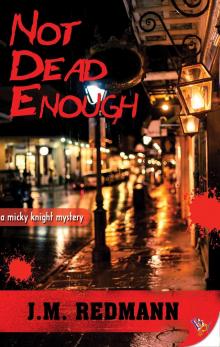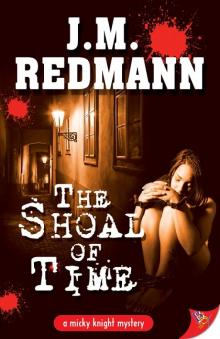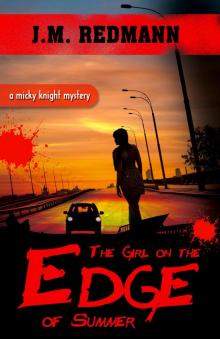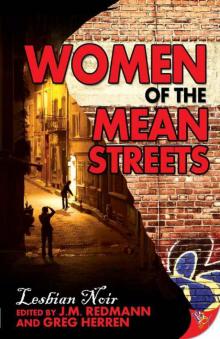- Home
- J. M. Redmann
J.M. Redmann - Micky Knight Mystery 7 - I'll Will
J.M. Redmann - Micky Knight Mystery 7 - I'll Will Read online
Synopsis
First, do no harm. But as New Orleans PI Micky Knight discovers, not every health care provider follows that dictum. She stumbles into a tangle of the true believers to the criminally callous, who use the suffering of others for their twisted ends. In a city slowly rebuilding after Katrina, one of the most devastated areas is health care, and the gaps in service are wide enough for the snake oil salesmen—and the snakes themselves—to crawl through.
The seventh Micky Knight mystery.
Ill Will
Brought to you by
eBooks from Bold Strokes Books, Inc.
http://www.boldstrokesbooks.com
eBooks are not transferable. They cannot be sold, shared or given away as it is an infringement on the copyright of this work.
Please respect the rights of the author and do not file share.
Ill Will
© 2012 By J.M. Redmann. All Rights Reserved.
ISBN 13: 978-1-60282-697-7
This Electronic Book is published by
Bold Strokes Books, Inc.
P.O. Box 249
Valley Falls, New York 12185
First Edition: April 2012
This is a work of fiction. Names, characters, places, and incidents are the product of the author’s imagination or are used fictitiously. Any resemblance to actual persons, living or dead, business establishments, events, or locales is entirely coincidental.
This book, or parts thereof, may not be reproduced in any form without permission.
Credits
Editors: Greg Herren and Stacia Seaman
Production Design: Stacia Seaman
Cover Design By Sheri ([email protected])
By the Author
The Micky Knight Mystery Series:
Death by the Riverside
Deaths of Jocasta
The Intersection of Law and Desire
Lost Daughters
Death of a Dying Man
Water Mark
Ill Will
Women of the Mean Streets: Lesbian Noir
edited with Greg Herren
Acknowledgments
A book is written alone. But the encouragement, the information, the knowledge, the editing, and the myriad of other background activities require other people before any author can sit alone in a room and write a book. This was an especially difficult book to write as I found that I didn’t know—let’s be honest, didn’t have a clue—about certain elements of this book and had to consult various people more knowledgeable than I am, most particularly on the medical aspects of the book. My friends and consultants are competent and educated professionals; any mistakes are mine and mine alone. I’d like to thank Linda and Mary Ellen for setting me on the right path (and sushi), Jody for making connections, and Georgia for patiently answering what must have seemed like bizarre questions. Also the CDC and NIH websites for useful information. Plus various staff members at NO/AIDS who also assisted.
A big thank you to Greg Herren for his editorial insight and calmness in the midst of my rewrite storm. Also a big thanks to Cherry, my Web goddess, for keeping me in the digital age and her partner, Beth, for the delightful dinners. Charbroiled oysters are a thing of wonder and beauty. Of course I can’t forget Mr. Squeaky, because if there ever was a cat smart enough to read and notice he was left out, it’s him. Arnold, his furry companion, also deserves a mention just to not leave him out, although he has yet to figure out where the treats are kept—reading is way beyond him. Needless to say, I need to thank my partner, Gillian, who is the one who puts up with me disappearing all day at the day job and then taking up the evenings with writing (and rewriting and editing and promoting and everything else that goes with a writing career).
There are many people at my day job who keep me sane and are greatly encouraging and understanding about the writing career. Noel, our CEO and my boss, for his tireless leadership and letting me run off to do book things. My staff are great and make my job easy enough that I have time to write—Josh, Mark, Narquis, Robin, Melanie, Lauren, and all the members of the Prevention Department. I would love to be able to write full-time, but since I have to have a real job, I’ve very lucky to have one of the best ones I possibly could have.
Also big thanks to Rad for making Bold Strokes what it is. Ruth, Connie, Shelley, Sandy, Stacia, and Cindy for all their hard work behind the scenes, and everyone at BSB for being such a great and supportive publishing house.
Chapter One
He slammed the plastic container onto my desk. “Murder, I tell you, death in a chewable pill.”
It was the end of the day—a long day. I still had to make the lengthy trek Uptown to buy groceries. I knew Cordelia wasn’t going to do it. No matter how long my days were, hers always seemed to be longer.
“What are you going to do about it?” he demanded.
I was about to ask him a very similar question—“What do you expect me to do about it?”—with great effort to keep the extreme annoyance out of my voice.
Mr. Charles Williams had called about an hour ago, told me he had to see me today, that it was urgent. I told him if he was here by 5:00 p.m. I would see him. He showed up just after 5:20 as I was packing to leave. He was a tall, heavyset man, with a scraggly beard as if he didn’t have time to shave. Or else he wanted the chin hair to counterbalance the hair that had receded to almost the exact top of his head. Or to hide the jowls that gave him a hound-dog look. There were muscles under the flab. I suspected Mr. Williams was used to intimidating people with his size and brawn. The onset of middle age and accumulation of too many pieces of fried chicken made that hard to do, and now he had to match his volume to his paunch.
My day had started at 7:00 this morning, with a drive to and back from Lafayette. Yesterday I had not gotten in until 10:00 after an evening of fruitless surveillance. Right after Katrina, I’d thought, what the hell does a destroyed city like New Orleans need a private investigator for? I learned quickly that chaos brings a need for order. My cases ranged from tracking down missing people—one to a grave in Iowa, another to a new life with a different name in Las Vegas, and the rest to just about every physical and psychic location in between—to insurance fraud, both on the part of people whose only visit to the area was to file a claim and insurance companies doing all they could to avoid paying after gobbling up premiums for decades.
Mr. Williams hadn’t said what he wanted, just that it was urgent. Just not urgent enough for him to actually be on time for our appointment, I noted.
Someday I’ll learn, I thought, as he stared at me. People who won’t divulge what they want on the phone are hiding something. Some are paranoid, unwilling to use a thing that can be tapped or traced—in itself not a good sign. But most of them know they’re likely to be turned down over the phone and are hoping once they become a real live person in my office I’ll see it their way.
This rarely happens.
It wasn’t happening today.
“I think the FDA handles cases like that,” I finally said.
“You tell me where the fuckin’ FDA office is. I couldn’t find it before Katrina—”
I resisted the urge to stand up as he loomed over the desk. I knew the tricks and didn’t intend to fall for his amateur versions.
“Mr. Williams, I understand that you’re upset, but this isn’t the kind of case I can help you with—”
“You don’t get it!” he thundered, rattling the pill bottle under my nose. “People are dying. This stuff is poison they sell as nectar. No doctors, no hospitals, people are desperate. Some medical pirate promises a cure and they buy it. But the cancer doesn’t get cure
d, AIDS doesn’t go away. People are dying and something has to be done!”
As discreetly as I could, I glanced at my watch. Six o’clock was gone and would not return. I had a life to live and I couldn’t solve Mr. Williams’s problem. He’d given me the last speech two previous times, as if repetition would get me to change my answer.
He finally took a breath and I jumped in. “My standard rate is a hundred dollars an hour. If you want me to look into this, we can sign a contract, you pay an advance, and I’ll see what I can do.” At least that was the rate I quoted to people I wanted to get rid of.
“A hundred an hour?! I can’t afford that!”
I was tired of this man and his exclamation point sentences. “I’m a private investigator, not a public service.”
“You want to make money off people dying?” he demanded.
It’s much harder to bully people over the phone—that was why he insisted on coming in person.
“I’m a private investigator, not a charity,” I repeated. In an attempt to end this, I suggested, “You can do this on your own, you don’t need to pay anyone. You can do most of the research on the Internet. Wait outside the office, talk to the people that go in and out and—”
“I don’t have time for that. I work full-time and I’m rebuilding two houses.”
“You want someone to do it for free, it’s going to have to be you.” I stood up. “I cannot do anything for you. This is not the kind of case I handle. You need to get someone with authority to solve this. I am not that person.” I snapped off my computer without even bothering to shut it down. We’ve had so many unexpected power outages here, one more wouldn’t make a difference. “You need to leave.” He started to say something and I pulled out an exclamation point of my own. “Now!”
He reluctantly turned to go, moving as slowly as he could to be defiant. At my door he turned and said, “If my nephew dies, it’ll be on your hands because you refused to help me!”
I had been on the verge of losing my temper for the last half hour; the struggle ended. “If your nephew dies, it’ll be your fault because you made one feeble attempt to dump the problem on someone else rather than bothering to…”
He was already down the stairs, finally moving quickly to ensure that whatever I said he wouldn’t hear.
What a fucking day, I thought as I threw my stuff into my briefcase. I’d been out in Lafayette to give a grieving presumed widow the not-so-cheery news that her husband was alive and well—and had changed his name, acquired a new Social Security number, and was living with a new wife in Vegas. I understood her throwing the lamp was more at him than me, but it still required the kind of fancy evasive footwork I try very hard to avoid. Even more annoying, she was having far too great an emotional storm for me to discuss my bill. People surprised me; sometimes the bad news ones paid promptly and the ones I gave good news to were chiselers. However, given that Ms. Left-for-Vegas now had neither a husband to support her nor his death insurance money, this one wasn’t looking promising.
I gave Mr. Williams enough time to be well away from my doorstep before heading out.
As I locked the outer lock I heard footsteps coming up the stairs. I was alone in the building at this hour. The only possible other tenant was the space-cadet artist on the first floor, but he could barely find his way out the door; dialing 911 would take two days of detox.
Violence, like ducking thrown objects, is something I try very, very hard to shun. Mostly I succeed. But today didn’t seem like it wanted to cooperate.
“Fuck,” I muttered, dropping my briefcase and pulling out my gun. Cordelia hates that I carry one. But post-Katrina New Orleans has aspects of the Wild West to it. Construction work has brought in an influx of men with a deficit of women to keep them in line. Plus, the crooks had come back. They couldn’t get a FEMA loan to cover the cost of lost cocaine; the dealers who had sold it to them weren’t happy about not getting paid, and with fewer people in the city there were fewer addicts to sell to. Turf wars had sprung up. Plus, the criminals were as messed up about losing their homes as the rest of us, and a punk with a gun and post-traumatic stress syndrome is not a pleasant person to deal with.
I was hoping it was Mr. Charles Williams coming back for one last speech and the sight of me in a don’t-fuck-with-me stance and the black barrel of a pistol pointed down the stairs would cause him to rethink.
I eased the safety off as the footsteps rounded the landing below me.
My stair climber was not a criminal, but a police officer.
One not very happy police officer. “Put that down right now,” she told me.
I did. It is so impolite to point guns at friends. Especially friends who are cops and can point a gun back at you. My stair climber was Joanne Ranson, NOPD.
Something told me this was not a “hey, let’s go out for beer” type visit.
I didn’t even ask. I turned around and unlocked my office door. I muttered, “I meant to be gone an hour ago.”
“Just my luck that you’re not.”
I noticed she didn’t call it good luck.
“What do you know about Carl Prejean?” she asked as she followed me in.
“Who?” I said, sitting at my desk.
Joanne ignored the visitor’s chair and perched on the near corner, forcing me to look up at her. I was getting a stiff neck from all these looming people.
“Like why would someone torch his house and car and why would he claim you sent them?”
“What?” I almost asked how and why, just to get all the interrogatives out of the way.
“He had your card, said you had hunted him down and threatened him.”
Now it was coming back to me. “Wait, that’s not quite what happened.”
“So, tell me what did happen.” She crossed her arms. This was official police business.
“Carl Prejean aka Karl Pearlman aka Cal Parker aka who knows who else, claims to be a contractor. A group of homeowners hired me to track him down after he absconded with their money.”
“You know that for sure?”
“I’m not an amateur. They showed me cashed checks. I toured the properties. His only work on any of them was to show up, fake an estimate—I saw those, too—then disappear with the money. They wanted to find him to sue him.”
“Well, one hothead decided not to wait for our courts to get back in gear. I’ll need your client list.”
I crossed my arms. “Not without more proof that one of them had something to do with it. He’s a scumbag, and scumbags treat everyone to their pond slime. It could be an ex-girlfriend who didn’t like him not paying child support, or workers he didn’t pay, or other clients he ripped off.”
“Except that you tracked him down and told them where he lived.”
“I didn’t suggest that they burn down his place, nor would I have given them the information if I thought they would do anything like this.” I get pompous when I get defensive.
“I’m not accusing you. But your group knew which house to burn. I have no proof those other people exist or that they knew how to find him.”
“Joanne, these are all honest, law-abiding people. The oldest was an eighty-two-year-old woman. He ripped her off for forty thousand dollars. She can’t afford to rebuild now and she’s going to probably have to spend the rest of her life in a rental apartment in Houston because of this crook. I’m not giving you their names without a subpoena.”
“You think he deserved it?”
“You think he didn’t?”
We stared at each other for a moment. I continued, “I told him the homeowners wanted either the repairs or their money back, with a strong preference on the latter. He blew me off, told me they could go fuck themselves and the next time I came near him, he’d greet me with a shotgun. He chose to rip them off, to make money off desperate people. He should go to jail and be sued for every penny he owns.”
“But he wasn’t. He had his house burned down instead.”
“So now he has
what he left them with—a ruined house. At least he’ll get his insurance money and not have it stolen by a fake contractor.”
We again stared at each other.
“I’m not giving you their names.”
She sighed, and said, “I know.” Then added, just because she’s a cop, “You didn’t do it for them, did you?”
“No, I didn’t. Although I don’t think I would’ve pissed on him to put the fire out. Plus every one of their homes was stripped of anything valuable—copper wire, upstairs carpet, toilets. After they signed contracts with him.”
“Hard to prove. Those thieves are everywhere.”
“He’s not the innocent victim in all this. It wouldn’t be bad if he decided to relocate.”
She sighed again. “You need to watch your back. He said if he ever saw that girl private eye, she’d regret it.”
“I don’t plan on seeing him again.”
“He might have other ideas. He knows where your office is. Watch your back.”
“Why I carry a gun. I’m tired, I want to go home. Do I get a police escort to my car?”
“If you escort me to mine.” She slid off the desk, indicating this interview was over. She’d done her job. We all made those calculations—how much time, how much effort, and finally, was it worth it. She knew I had a point, if he’d ripped off my ten clients it was likely that he’d cheated multiple others. If I could find him—and it hadn’t been that hard, he wasn’t as clever as he thought he was—others could as well. Would my list of clients bring her closer to the person whose breaking point was breaking the law? Or would it just subject innocent people to an undeserved hell on top of the hell they already lived in?

 Not Dead Enough
Not Dead Enough Ill Will
Ill Will The Shoal of Time
The Shoal of Time The Girl on the Edge of Summer
The Girl on the Edge of Summer Women of the Mean Streets
Women of the Mean Streets J.M. Redmann - Micky Knight Mystery 7 - I'll Will
J.M. Redmann - Micky Knight Mystery 7 - I'll Will